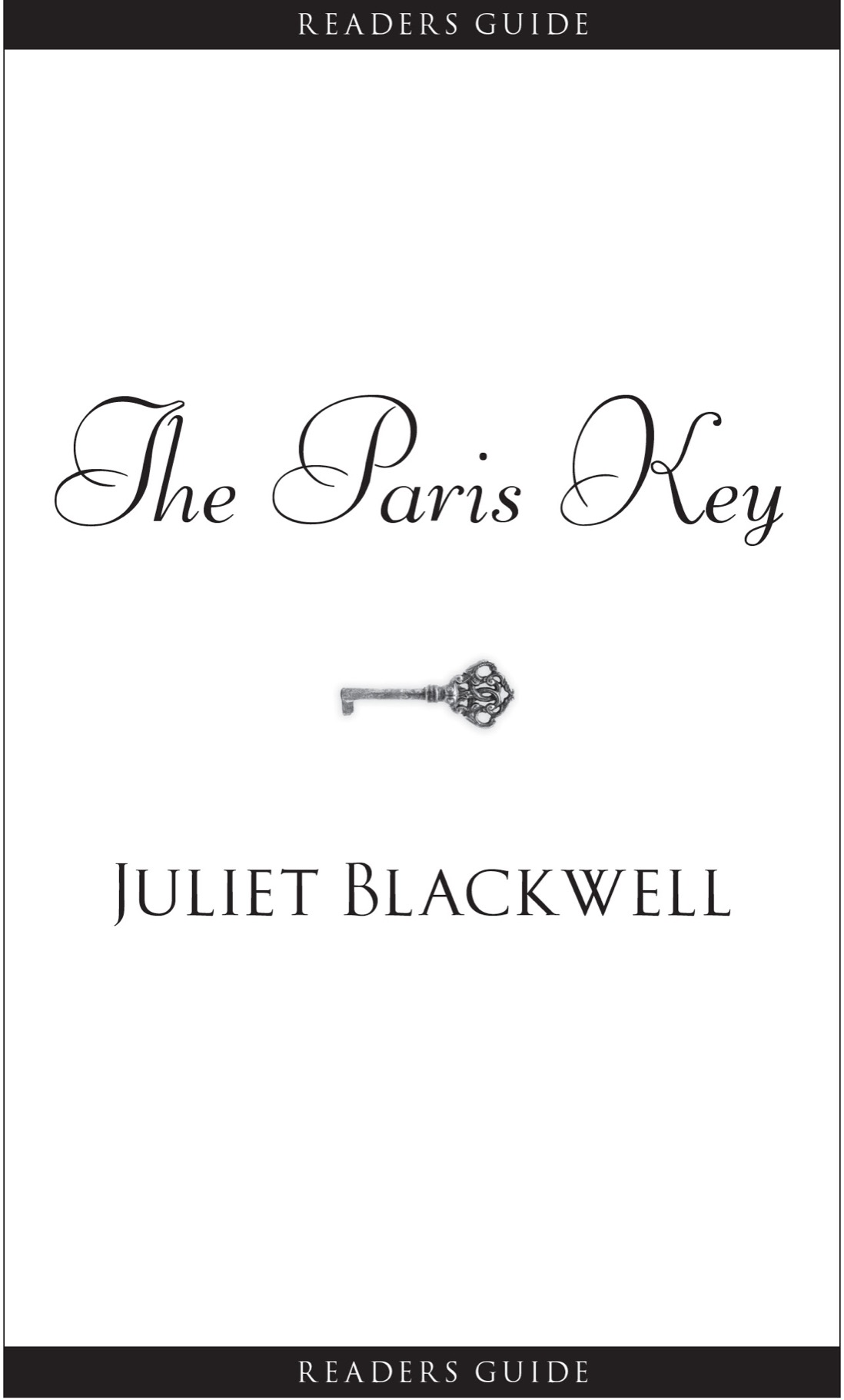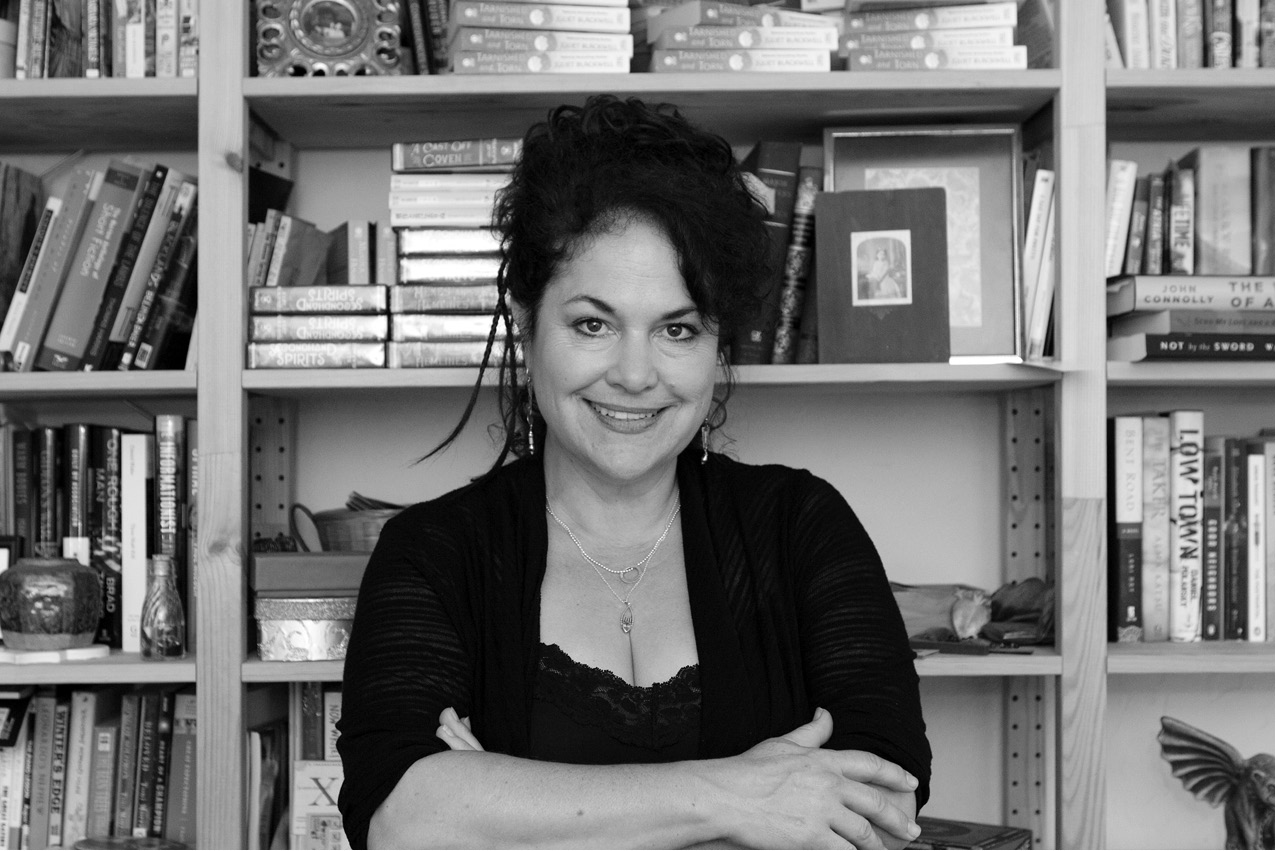The Paris Key (37 page)
Authors: Juliet Blackwell


A CONVERSATION WITH JULIET BLACKWELL
Q. What first inspired you to write
The Paris Key
?
A. Like so many people before me, I fell in love with Paris the first time I visited (many years ago). I have returned several times since, and then two years ago I rented a rustic French farmhouse from a friend and spent a month in the countrysideânear Bergeracâbefore heading to Paris. While there I discovered the Village Saint-Paul, a true fairy-tale-like neighborhood. I stumbled upon a dusty old locksmith shop and wound up having a fascinating talk with the elderly shopkeeper about the history of keys and locks. He fixed me a cup of tea, his granddaughter joined us, and neighbors dropped in! From that moment I knew I had to set a novel here, in this shop and this neighborhood and this city.
Q. Did Genevieve's character surprise you in any unexpected ways as you wrote the book?
A. I think Genevieve's bravery surprised me! I believe most of us have times when we feel like we'd like a do-over in life, but embracing change can be frightening. Genevieve is emboldened by her memories of being happy in Paris as a young teenager, but she's still taking a huge chance to move to a foreign country. And once there, Genevieve doesn't simply dwell in the past, but allows herself to shift her way of thinking, to experience the French approach to life. I remember thinking at one point,
Genevieve, are you going to get on this whole certification thing?
and she answered,
Yes, maybe after another glass of pastis.
She was embracing the Parisian pace of life! (And, yes, I do “talk” to my characters!)
Q. How much do you think suffering such a deep loss at an early age informed Genevieve's personality? And in what ways did it impact her outlook on life?
A. I think she shut down certain parts of herself. I was a social worker for many years, and I learned that when we experience trauma at a young age, sometimes parts of us get “stuck” at that age. It makes it hard to move on, to achieve a mature outlook on life, such as opening up to new experiences and taking responsibility for our own happiness. The young Genevieve was hit hard by her mother's death, but also by what she felt was a second rejection when she was forced to leave Paris, and then by her father and brother's different manner of processing grief. The adult Genevieve was given a rare chance to “know” certain aspects of her mother (and her uncle, and her father, Jim) that had been lost to her, and by facing them she was able to accept and open herself up to a fulfilling life.
Q. Genevieve's cousin Catharine and her new friends, Sylviane and Philippe in particular, are such vibrant and unique characters. Did you have a favorite secondary character in the book?
A. I would have to say Sylviane. I just love her energy and fun outlook on life. She has the straightforward, honest, yet sweet and caring style characteristic of many of the Frenchwomen I know. It can be rather startling at first to a Californian who is used to polite obfuscation, but ultimately I find it so charming! And after all, who wouldn't want a Parisian friend like Sylviane to take you to historic cemeteries and shopping and lunchâand to do a Parisian-style makeover?
Q. Would you ever consider moving to Paris for a year? What about life there most appeals to you?
A. Short answer:
Yes!
There are the obvious reasons: the wine, the food, the music and romance and art and architecture and history. But there's so much more. Even though Paris is a sophisticated, international city, things in Europe are still more old-fashioned than in much of the United States: There's an emphasis on family and long meals and conversation and taking time to relax and enjoy. I find this not only in France, but also in Italy and Spain and Mexico and Cuba. Even though I was born and raised in the area that became California's Silicon Valley, and even though I use computers every day to write and correspond and reach out to readers, I feel like some human part of us has been lost in the modern shuffle. I relish the slower pace, a chance to sit in parks and dream and read; and the knowledge that the time spent
not
working is easily as important as the time spent toiling away. And finally, I love to travel: I adore meeting new people and learning new languages and experiencing different ways of life. I think it opens up one's mind and soul and heart.
Q. What do you think will be the biggest impact of Genevieve's decision to follow her heart? Do you think she will be more successful at opening herself up to those around her in Paris than she was back home?
A. Oh yes, very much so
. The Paris Key
is about a moment of transition: not so much of an unhappy woman finding happiness, but more a shut-down person learning to open herself up to life: to new experiences and friends and love
and
even heartbreakâbecause you have to be willing to risk heartbreak in order to truly love. I imagine Genevieve will pursue her training as a locksmith, will continue to get to know her neighbors, and will take on her uncle's role as a cherished member of the community. Perhaps with Killian at her side, and perhaps not. Either way, I think she will make her decision based not on fear, but on what she wants and needs as a woman.
Q. There's an undercurrent of mystery running throughout
The Paris Key
. As a mystery author as well as an author of women's fiction novels, was that piece important to you?
A. I think all novels are mysteries at their base: Why did so-and-so do what they did? What happened? What was the motivation? What will happen in the future? How will the issues be resolved? As humans, we're hard-wired to be curious about other people's lives and experiences. We read in order to hear a story, to find out what happened or what the characters decide, and who they really are. I've always been drawn to stories about secretsâespecially family secretsâand their long-reaching ramifications. Writing
The Paris Key
was different from my genre writing in that I was able to delve much more into the psyches of my characters and how the past affects them, rather than trying to uncover a murderer! It felt luxurious, somehow, to recount the sensory details of the Parisian surroundings and to explore the personal reflections and reactions of the characters. And in the end, to find out the whole mystery, since it was unraveled only as I wrote
The Paris Key
!
QUESTIONS FOR DISCUSSION
1. Genevieve is sure that a drastic change of sceneâmoving to Parisâwill make her happy. Do you believe in the geographical cure? What do you think about the possibility for new or different surroundings to bring out hidden aspects of someone's personalityâor do they just make familiar problems worse?
2. When Genevieve moves to Paris, she leaves her comfort zone behind her. What do you feel is the hardest part about moving somewhere new? After reading
The Paris Key
, what do you think are the best and worst aspects of being forced out of one's comfort zone?
3. Genevieve finds life in Paris slower than in the United States, with a greater emphasis on seemingly old-fashioned pursuits such as reading, cooking, and spending time in parks and museums. Do you think you would enjoy that sort of lifestyle? How do you feel you would adjust to the slow pace of life in France? Do any potential drawbacks come to mind?
4. Do you think tourists see famous cities differently than the residents? In what ways? Will the novelty of Paris wear off for Genevieve, or will she find a permanent home there? What from the story makes you feel that way?
5. Genevieve often wishes she could have known her mother as an adult. Do you think women are destined to become some version of their mothers? In what ways do you think Genevieve became like hers, and in what ways did she follow a different path?
6. Did her Paris experiences transform Genevieve into someone newâor did it make her a “better” version of herself?
7. Are there parts of Genevieve's married life you can relate to? How about Angela's life on the farm in Petaluma?
8. Do you enjoy a novel more when the heroine is someone a lot like you or someone very unlike you?
9. Do you think what Angela did was unforgivable? How do you think it related to her struggles with depression?
10. Throughout the book, Sylviane encourages Genevieve and helps her adjust to living in Paris. Do you think Genevieve would have made the same choices without Sylviane's support? Do you have someone like this in your life? When have you been most grateful for his or her point of view?
11. Would you have gone down to explore the catacombs, despite the warnings to steer clear? Do you think the catacombs serve as a metaphor in the novel, and if so, in what ways?
12. Does it really matter who Genevieve's biological father was? Do you think Jim knew the truth? What about Dave? If Angela had lived, do you think she would have told Genevieve when she was old enough to understand?
13. What do you think are the most powerful uses of symbolism in
The Paris Key
? Do you agree with Catharine that the fable of “Fitcher's Bird” was relevant to Genevieve's experiences?
14. An important turning point in the book comes about when Genevieve has a realization: “Genevieve feared she kept her mother's ghost alive, kept it strapped to her back like a proverbial monkey.” Do you think Genevieve would have been able to release her mother's ghost if she hadn't come to Paris?

Photo © Joseph Schell Photography
Juliet Blackwell
was born and raised in the San Francisco Bay Area, the youngest child of a jet pilot and an editor. She graduated with a degree in Latin American studies from the University of California, Santa Cruz, and went on to earn master's degrees in anthropology and social work. While in graduate school, she published several articles based on her research with immigrant families from Mexico and Vietnam, as well as one full-length translation: Miguel León-Portilla's seminal work,
Endangered Cultures
. Juliet taught medical anthropology at SUNY-Albany, was producer for a BBC documentary, and worked as an elementary school social worker. Upon her return to California, she became a professional artist and ran her own decorative painting and design studio for more than a decade. In addition to mainstream novels, Juliet pens the
New York Times
bestselling Witchcraft Mysteries and the Haunted Home Renovation series. As Hailey Lind she wrote the Agatha Awardânominated Art Lover's Mystery series. She makes her home in northern California, but spends as much time as possible in Europe and Latin America.
Looking for more?
Visit Penguin.com for more about this author and a complete list of their books.
Discover your next great read!
